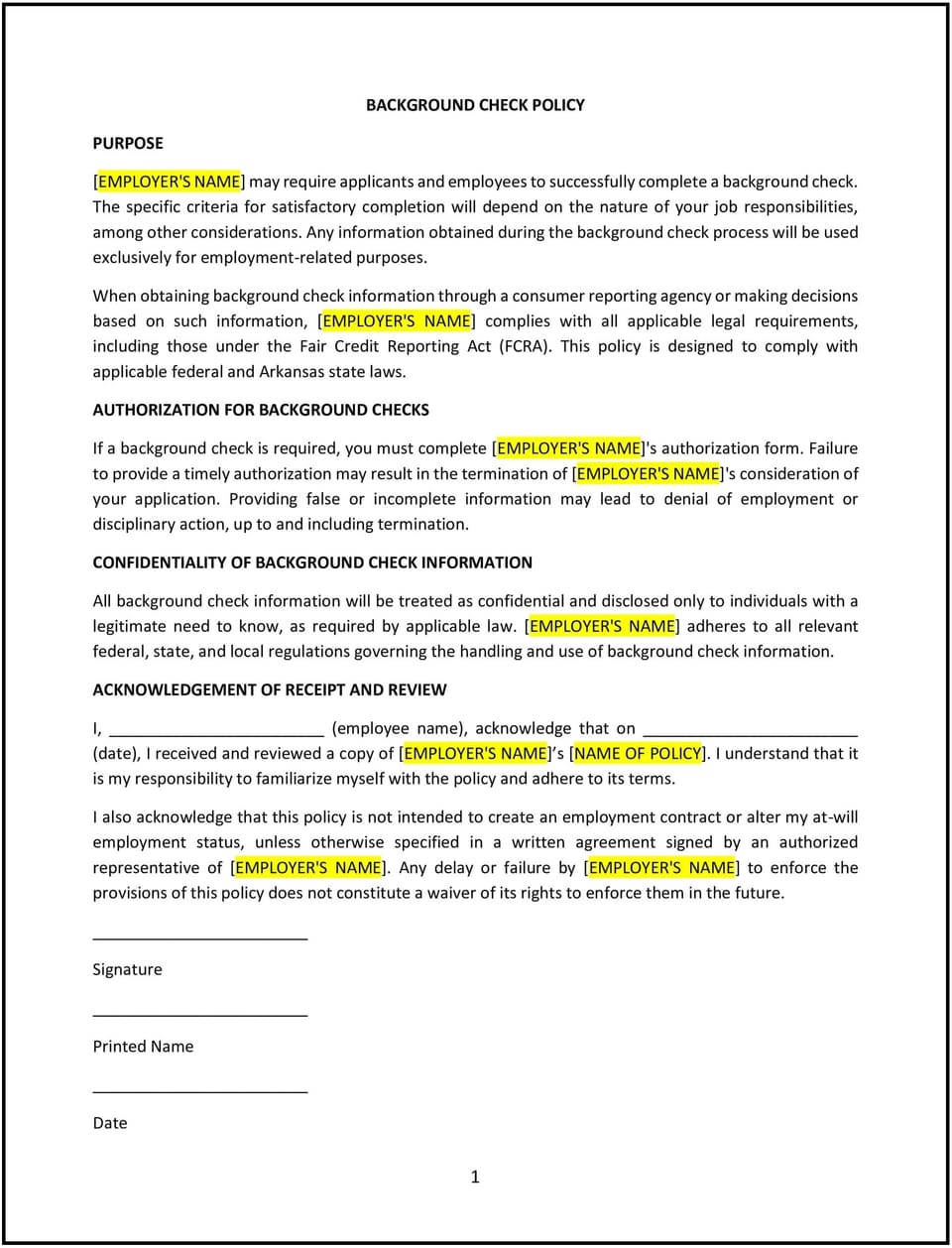Background check policy (Arkansas): Free template

Background check policy (Arkansas)
In Arkansas, a background check policy provides businesses with clear guidelines for conducting pre-employment and employment-related background screenings. This policy ensures that the business adheres to federal and Arkansas-specific regulations while promoting a safe and trustworthy work environment.
This policy outlines the types of background checks the business may conduct, the process for obtaining employee consent, and how the information will be used. By implementing this policy, Arkansas businesses can make informed hiring decisions, reduce risks, and support compliance with state and federal laws.
How to use this background check policy (Arkansas)
- Define the purpose of checks: Clearly outline the objectives of conducting background checks, such as ensuring workplace safety, verifying qualifications, or meeting regulatory requirements.
- Establish consent procedures: Require written consent from candidates or employees before initiating background checks, in accordance with Arkansas and federal laws, such as the Fair Credit Reporting Act (FCRA).
- Specify types of checks: Identify the checks conducted, such as criminal history, employment verification, education, credit history (if applicable), or driving records.
- Ensure compliance with regulations: Adhere to Arkansas-specific rules and federal laws, ensuring non-discrimination and proper handling of sensitive information.
- Communicate adverse action process: Clearly outline the steps the business will take if adverse information is found, including providing notice and an opportunity for the candidate or employee to respond.
Benefits of using this background check policy (Arkansas)
This policy offers several advantages for Arkansas businesses:
- Reduces hiring risks: Ensures that candidates meet job requirements and helps prevent potential issues related to fraud, safety, or performance.
- Supports compliance: Aligns with Arkansas and federal laws, such as the FCRA, ensuring the business follows legal procedures and protects candidate rights.
- Promotes workplace safety: Helps identify potential risks by screening for relevant criminal records or other red flags before employment begins.
- Enhances hiring transparency: Clearly communicates the background check process to candidates, fostering trust and professionalism.
- Protects business reputation: Reduces the risk of negligent hiring claims or other liabilities by performing due diligence during the hiring process.
Tips for using this background check policy (Arkansas)
- Address Arkansas-specific considerations: Include any state-specific restrictions or requirements for conducting background checks, such as limits on accessing certain records.
- Train HR personnel: Ensure that HR staff are familiar with the policy and trained on conducting background checks in compliance with Arkansas and federal laws.
- Maintain confidentiality: Protect sensitive information obtained during background checks by limiting access to authorized personnel and securely storing records.
- Regularly review the policy: Update the policy as needed to reflect changes in Arkansas laws, federal regulations, or business needs.
- Use a reliable screening provider: Partner with a reputable background check provider to ensure accurate and legally compliant screenings.
Q: How does this policy benefit the business?
A: This policy helps the business reduce hiring risks, ensure workplace safety, and support compliance with Arkansas and federal regulations, enhancing the overall hiring process.
Q: What types of background checks can the business perform?
A: The business may conduct criminal history checks, employment and education verifications, credit history reviews (if applicable), and driving record checks, depending on the role's requirements.
Q: How does this policy support compliance with Arkansas laws?
A: The policy aligns with Arkansas-specific rules and federal regulations, such as the FCRA, ensuring proper procedures for obtaining consent, using information, and handling adverse actions.
Q: What steps should the business take if adverse information is found?
A: The business must provide the candidate or employee with a pre-adverse action notice, a copy of the report, and an opportunity to dispute or explain the findings before making a final decision.
Q: How can the business ensure confidentiality of background check information?
A: The business should restrict access to background check information to authorized personnel, securely store records, and dispose of them in compliance with state and federal data protection laws.
This article contains general legal information and does not contain legal advice. Cobrief is not a law firm or a substitute for an attorney or law firm. The law is complex and changes often. For legal advice, please ask a lawyer.


